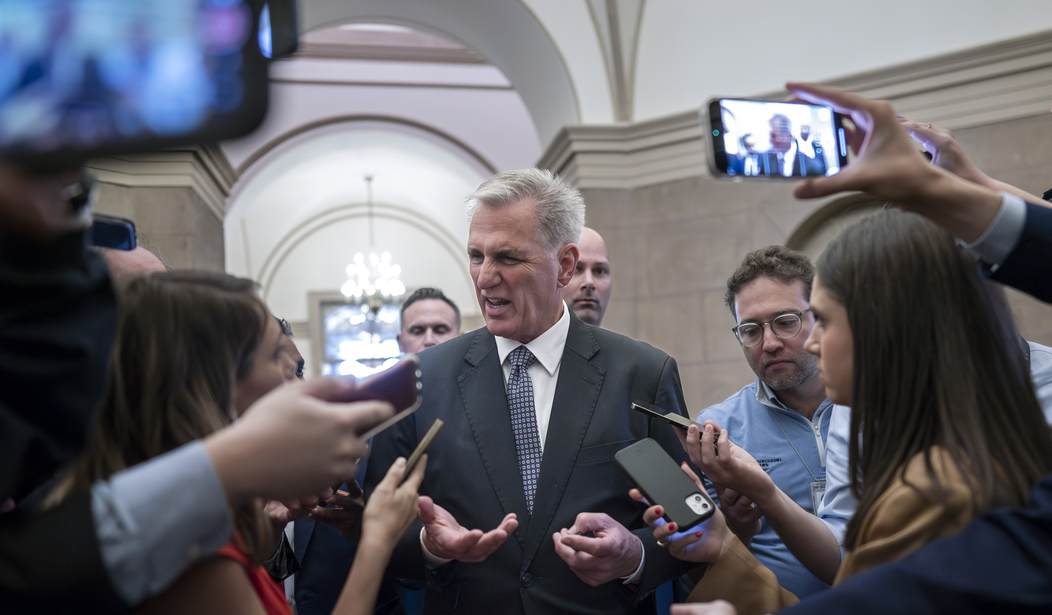House Speaker Kevin McCarthy spent the last 48 hours putting out the fires of rebellion on the far right over the debt limit agreement with the White House and as of Wednesday morning, it appears he has been successful. Nose counters on the Hill are saying that, as of Tuesday evening, no more than 30-35 Republicans will refuse to vote for the debt ceiling bill as it moves to the House floor sometime later today.
That’s more than enough votes for passage if you include the 100 or so Democrats who are expected to vote for the bill. And while McCarthy’s “victory” may be hailed in some quarters, the stark reality is that there are several Republicans who may move to kick him to the curb with a “motion to vacate” the speaker’s chair. At the very least, that could lead to another round of acrimonious infighting by the GOP.
There is a large sense of betrayal among the House Freedom Caucus members who negotiated an agreement with McCarthy to vote for him for House speaker as long as he didn’t raise the debt ceiling without substantial cuts to the budget. McCarthy signed off on a deal that cuts about $80 billion over the next ten years from the IRS and “repurposes” another $30 billion clawed back from COVID relief funds.
More importantly, non-defense discretionary spending is virtually frozen for the next two years. This will require Congress to slash tens of billions of dollars in future spending — an unprecedented action by the House.
So it’s debatable whether McCarthy lived up to his promises. This has provoked a group of Freedom Caucus members led by Rep. Chip Roy to threaten to force a vote to oust the speaker unless drastic changes in the deal are made.
“If we can’t kill it, we’re going to have to regroup and figure out the whole leadership arrangement again,” Mr. Roy said Tuesday on Glenn Beck’s radio show.
Now, Mr. Roy, who is a mix of legislative wonk and speechifying firebrand, has been circulating documents breaking down all the different ways he believes Mr. McCarthy’s 99-page debt limit deal is, in his words, a “betrayal” of conservatives. In an easy-to-digest format, they lay out — step by step — how the agreement Mr. McCarthy reached with Mr. Biden falls short of conservative demands to rein in spending, streamline energy project permitting and impose stringent work requirements for social safety net benefits.
He and his allies view the country’s $31.5 trillion national debt as a greater threat to America than the Treasury Department’s warning that the country could default on certain bills by June 5.
In the long term, they are inevitably correct. But what some in the Freedom Caucus and elsewhere fail to take into account is that it’s taken more than 50 years to put the United States into the untenable position it’s in today — carrying a $31 trillion debt. Cutting the budget as deeply as some Republicans want would be a catastrophe not just for the poor, but for the middle class as well. In the last 20 years, more and more social spending has gone to propping up the middle class, whose wages have not kept pace with inflation and whose standard of living has continued to fall.
Related: McCarthy Recites the RINO Creed: ‘We Let Government Grow, But at a Slower Rate’
That hasn’t stopped some on the right from sharpening their tomahawks to go after McCarthy.
The central flaw in McCarthy’s approach to this deal was his entire messaging in the lead-up to this act of political adultery. Rather than drawing a line in the sand on the GOP-passed bill and then making the battle about debt, inflation, and the weaponization of government, he made the battle about getting Biden to negotiate and about not defaulting on the debt. In other words, he conveyed the message that Republicans fear not raising the debt limit just as much as the Democrats. Perforce, Biden easily agreed to “negotiate” so McCarthy could say he got “something” other than a “clean” debt limit increase. Once Biden agreed to negotiate and McCarthy wrongly validated June 1 as a drop-dead deadline, he had no leverage left. Hence, the interception rather than a touchdown in the form of the debt ceiling bill.
As I’ve said continuously, anyone who pretends to know what will happen if a debt deal isn’t passed by June 5 is uninformed. The danger isn’t that there’s a certainty of economic catastrophe. The danger is that we don’t know, and chancing a severe downturn in the short term is stupid and irresponsible.
One sign that McCarthy’s job may be a little safer than we might have expected is that the vote to send the debt deal out of the Rules Committee and to the floor saw only one other Republican besides Rep. Roy vote against the motion. And the number of Republicans who will probably vote for the deal may preclude the rebels from attempting a coup.
This time.










